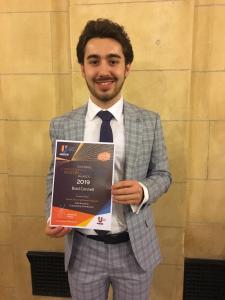On Thursday 18th October 2018, I attended a biological society talk at Bangor University, presented by Professor Guillaume Thierry; a professor of cognitive neuroscience at the university.
The talk aimed to show the audience how deceptive the brain can be using illusions and lies. Later, Thierry discussed bilingualism and how language can affect cultural norms.
Mind games
The first illusion was Adelson’s checker-shadow illusion, shown below.

Although appearing different, the two squares are the same colour. Thierry explained the brains knowledge on the effects of a shadow and how a chequered board works makes one square appear brighter.
Next, we were shown a video of a garden and told to focus on a cat. Throughout the video, unbeknown to myself, garden items were slowly changing colour.
The long duration of change and focusing on a separate object means the brain doesn’t notice any changes occurring.
Finally, Thierry installed doubt in the minds of everyone by instructing us to close our eyes and asking if the person next to them were there. Despite knowing they were, the brain creates a doubt that they’re not, prompting you to reach out and touch them.

Bilingualism
Thierry explained bilingualism before introducing us to some of his studies which involved eye tracking and event-related potentials (ERPs).
The first involved showing Chinese-English bilinguals a screen of 3 English words along with a chain of circles or squares. The next screen shown 4 words, one of which overlapped phonologically with the Chinese word for ‘circle’ or ‘square’.

Results shown bilinguals spend more time focusing on the words relating to circle or square, indicating they translate it back to their native language.
Next was an investigation where Chinese-English bilinguals and British individuals were asked what mothers would like post-partum and 4 options were shown: chicken soup, a rest, a shower or a carrot.
ERP results shown that when displayed in Chinese, bilinguals would choose chicken soup (Chinese tradition). However, when displayed in English, they focused more on a shower. This indicates that English language and culture has taken them away from their native norms.

My Thoughts
The first half of the seminar was interactive and interesting to see how easily the brain can be deceived despite being the most powerful organ in the body.
As a monolingual, I found it extremely impressive that bilinguals can translate an English word back to their native language due to the lexical similarity it has to an object they’ve just seen.
This seminar was deeply fascinating and prompted to read Thierry’s research. Despite gaining more knowledge on human neuroscience, I do not wish to pursue this as a career path.
However, throughout university I have discovered an interest in animal cognition, especially in primates. This seminar has only strengthened my interest. Looking through methods to measure ERP could be useful if I am lucky enough to conduct this kind of research in the future.
Below is some of Thierry’s interesting research:
https://www.sciencedirect.com/science/article/pii/S0010027713001625?via%3Dihub
https://www.researchgate.net/profile/Guillaume_Thierry/research
https://link.springer.com/article/10.3758/s13415-016-0411-x

